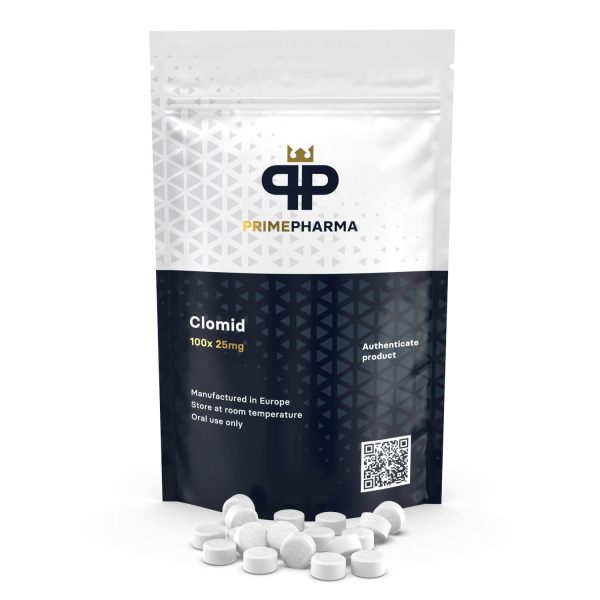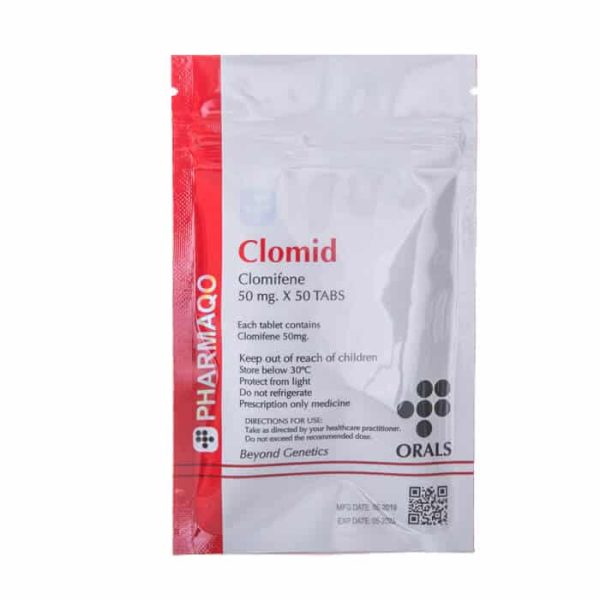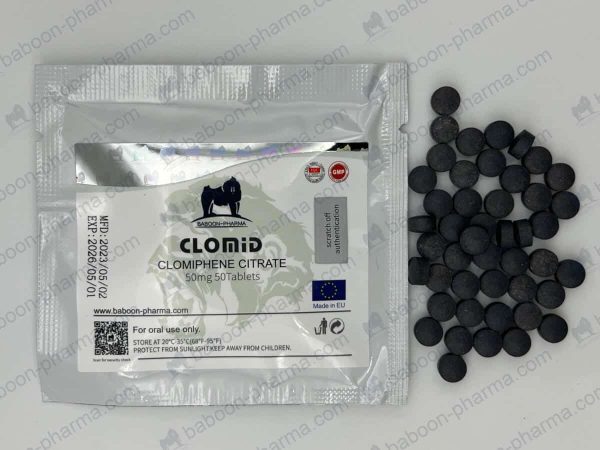Clomid (Clomiphene Citrate), Buy Clomid Online
Brand name: Clomid, Promifen
Generic name: Clomiphene Citrate
Active ingredient: Clomiphene Citrate
What is Clomid (Clomiphene Citrate)
Clomid is often used during Post Cycle Therapy (read more on our blog about PCT).
Clomid is a fertility medicine taken to persuade ovulation. Comprised of clomiphene citrate, the drug tablets are sold under the brand names Clomid (Clomiphene Citrate) and Serophene, and are obtainable throughout the world. Particularly, Clomid (Clomiphene Citrate) works to rouse a female’s ovaries to create an amplified amount of follicles each month. As Clomid amplifies the quantity of mature follicles in the ovaries, the drug also amplifies the possibility of ovulation and pregnancy.
Numerous couples who have difficulty conceiving opt to use this medication to increase their chances of becoming pregnant. The most popular medicine taken to heighten fertility is Clomid (Clomiphene Citrate).
How Does Clomid (Clomiphene Citrate) Work?
Clomid (Clomiphene Citrate) functions by working on a number of diverse receptors in the body with the intention of regulating hormone function. In particular, Clomid (Clomiphene Citrate) works to increase the quantity of 3 hormones implicated in the ovulation process, as well as:
- gonadotropin-releasing hormone (GnRH);
- luteinizing hormone (LH);
- follicle-stimulating hormone (FSH).
Clomid (Clomiphene Citrate) in effect tricks the body into believing that it has decreased levels of estrogen. Therefore the body seeks to raise production of GnRH, which, sequentially, kindles the release of FSH and LH. These hormones for that reason cause the ovaries to begin to develop supplementary follicles.
What is Clomid Used For?
Clomid (Clomiphene Citrate) is usually given for couples facing infertility, as well as:
- anovulation
- PCOS
- irregular menstruation
Clomid (Clomiphene Citrate) is also administrated to increase the number of follicles on hand for IVF treatment.
Utilizing Clomid
Clomid (Clomiphene Citrate) is used orally on precise days of your menstrual cycle. Depending upon your insurance plan, you may be put on Clomid (Clomiphene Citrate) on Days three – seven of your cycle, or Days 5-9 of your cycle. The dosage usually begins at 50 mg. Nearly all women remain on this amount for a cycle or two. If there is no revival in ovulation, the amount can be increased to at most 200 mg per day.
Clomid (Clomiphene Citrate) is generally applied for a maximum of 6 cycles, after which it will be suspended if it proves ineffective and another course of reproductive therapy may be suggested. Occasionally, Clomid (Clomiphene Citrate) will be combined with extra hormonal pills.
Latent Clomid (Clomiphene Citrate) Side Effects
Usually, Clomid’s (Clomiphene Citrate) adverse results are mild and not very upsetting. However, at a high dosage you may experience:
- mood swings;
- vomiting and sickness;
- breast pain;
- pain;
- fatigue.
30% of women applying Clomid (Clomiphene Citrate) experience changes in their cervical mucous. Cervical mucous can become harmful to sperm, thus inhibiting pregnancy.
Likely Problems of Clomid (Clomiphene Citrate)
The main possibility linked with Clomid (Clomiphene Citrate) use is the possibility for progressing Ovarian Hyperstimulation Pattern (OHSS). OHSS may happen among those using some category of ovulation increasing drug. It occurs while cysts begin to form on the ovaries, causing them to enlarge to a incredibly large dimension. Regularly, OHSS fades away with no treatment needed; without suitable screening, the pattern may grow to be dangerous. Possible complications include:
- kidney damage
- liver damage
- water collection in the lungs and abdomen
- twisting of the ovaries
Clomid (Clomiphene Citrate) Success Stories
Clomid (Clomiphene Citrate) is usually a very useful drug for most females suffering from ovulatory problems. In reality, between 70% and 90% of women taking Clomid (Clomiphene Citrate) initiate ovulation within the primary three cycles. Additionally, 40% of couples become pregnant during the first three cycles. It is important to be aware that there is a five percent to ten percent chance of twin pregnancy while using Clomid (Clomiphene Citrate). Talk to your fertility doctor if you are concerned about complex child-bearing.
















